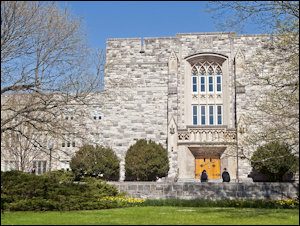by James A. Bacon
Virginia Tech wants another $70 million of your tax dollars. That’s a lot of money, but give Tech credit for thinking big. Its audacious plans for a $225 million Global Business and Analytics Complex could be the next big thing that elevates the university to ever greater heights of prominence. Of course, it also could represent a massive bet on a passing intellectual fad. But one way or the other, it’s BIG.
Here’s the idea: Tech wants to expand its Blacksburg campus to accommodate four new buildings — two academic and two living-learning residential communities for about 700 students. The academic buildings would become the new home of the Pamplin College of Business and house research space in Tech’s data analytics and decision sciences destination area.
“We believe that Virginia Tech can become an international leader in the complex nexus of data and decision making; where people, communities and policy meet big data analytics to produce solutions that improve the human condition,” said Executive Vice President and Provost Thanassis Rikakis, as reported by the Roanoke Star.
The dorms are expected to cost $73.5 million, which university officials say could be financed by state bonds. The academic buildings would cost about $140 million, half of which Virginia Tech would raise and the other half officials hope will come from the state.
Virginia Tech is infusing data and decision sciences into every corner of its teaching, research, and outreach, says Naren Ramakrishnan, director of Tech’s Discovery Analytics Center. “We are preparing students to be data-literate and empowering them to use the methods of data science to complement their disciplinary work. Our data analytics and decision sciences planning group draws members from engineering, sciences, business, liberal arts, humanities, and the natural resources.”
Tech’s long-term goal includes developing a health analytics complex at its Roanoke campus and a technology-focused complex in Northern Virginia.
Bacon’s bottom line: No question, Tech is tapping into a powerful economic trend. Big Data is one of the most all-pervasive forces at work in society today, and the harnessing of Big Data is one of the great challenges of government and industry. Someone has to teach this stuff — why not Virginia Tech? If Tech is an early entrant in this educational field, it could be very successful. Moreover, the economic benefits of hiring more professors and teaching more students — a lot of economic activity — could be leveraged many times over if Virginia businesses hire Pamplin graduates to reinvent their enterprises and become more globally competitive.
But that’s a lot of “ifs.” Tech wants roughly $70 million from the state to make this happen, and it will compete with Virginia’s other public universities, all of which have grand schemes of their own, for scarce funds. It doesn’t help that the General Assembly will be cutting spending, not adding to it, in the current budget cycle.
Here are some of the issues legislators need to consider:
- How else could the state invest that $70 million? That sum is larger than the $60.8 million allocated in 2017 to economic incentive funds for industrial recruitment, small business, brownfields, enterprise zones and movies put together. Those funds, incidentally, largely benefit working class Virginians and/or economically depressed communities.
- How much direct economic activity will the Global Business and Analytics Complex create in added payroll and other spending?
- What will be the indirect impact, in terms of improved competitiveness of Virginia business enterprises? Is that question even possible to answer?
- Where will the students go? If Virginia taxpayers are going to invest a massive sum in human capital, can we be assured that most graduates of this program will subsequently work for Virginia companies, enhancing their competitiveness? Or will out-of-state companies recruit them, meaning Virginia taxpayers are effectively subsidizing the human capital of our competitors?
- How many other higher ed institutions are pursuing similar strategies? Is this the next higher-ed empire-building fad in which everyone is hypes Big Data in order to bamboozle money from alumni and taxpayers? Are Stanford, MIT, Michigan State, Georgia Tech and a dozen other prestigious institutions all pursuing the same angle? Or does Virginia Tech really, truly have a unique idea?
This is just a start. I’m sure the list of questions can be refined. The payoff is potentially very big. But Tech is asking for serious money. Legislators need to give the idea serious deliberation.



